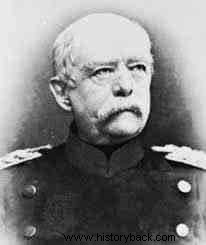Otto von Bismarck , Prussian soldier and politician, was born in 1815 in Schönhausen.
Bismarck unified the German states and built the foundations of the Second German Empire that lasted from 1871 to 1918.
He became known as the "Iron Chancellor" due to his relentless policy against his opponents.

Biography
Otto von Bismarck was born into a family of Junkers , the so-called wealthy landowners. With the intention of being a diplomat he studied law at the Universities of Göttigen and at the Humbolt University in Berlin.
He entered politics through conservative circles and was Prussia's ambassador to the Russian Empire and France. In 1862, the King of Prussia, William I, appoints him prime minister and Bismarck is dedicated to forging the unification of the Germanic states.
Realpolitics
The German term “Realpolitik” designated a European political current of the 19th century.
"Realpolitik" or political realism is based on the principle that politics should be free from ideological and moral principles. The political end of a State is to guarantee its own peace and order, even if it means making war.
Far from being contradictory, these ideas had already been expressed in the 15th century, by Niccolò Machiavelli in his book “The Prince”.
Bismarck was suspicious of the liberal ideas of his day such as universal suffrage, greater decision-making power for Parliament and freedom of the press. Hence, he practiced what he called “Realpolitik.”
One of the phrases that sums up his political personality well is "Freedom is a luxury that not everyone can afford."
In this way, upon being appointed prime minister, Bismarck dissolves Parliament, decrees censorship of newspapers and begins to promote German unification with "iron and blood".
German Unification
Two ideas coexisted to unify the 39 German states. The first was defended by Austria, Greater Germany, which would also bring together various peoples of the Austrian Empire such as Hungarians, Slovaks and Czechs.
The second would be the idea of “Little Germany”. This proposal consisted of bringing together only the German-speaking states, under the rule of the Prussian king, and without the participation of the Austrian Empire.
At this time, the North German Confederation promoted the unification of its customs and currency through the Zollverein.
This policy consisted of eliminating the differentiated rates and currencies of each small German state for a single customs and currency.
Read more about German Unification.
Wars
To convince the German states to join the Prussian project, Bismarck resorted to warlike political propaganda. He always insisted on German “military values” over artistic or humanistic values, for example.
In this way he successively provokes wars with Denmark, Austria and France. These conflicts develop the growing German heavy industry into the best in the world.
Learn about the Second Industrial Revolution.
The war against France was undoubtedly the most important. The Second German Empire was proclaimed in the middle of the Palace of Versailles, France condemned to pay reparations and hand over important regions rich in coal.
Although the German victory was indisputable, this would provoke strong anti-German sentiment in the French, which would culminate in the First World War.
Understand the Franco-Prussian War.
End of Career
For his services to the Kingdom of Prussia and the German Empire, Otto von Bismarck was awarded the noble titles of count, prince, and duke.
During the reign of William I, Bismarck enjoyed the monarch's full confidence. However, after his death and the accession of his heir, William II, in 1888, Bismarck's policies clashed with the new sovereign.
The chancellor is forced to resign in 1890 and retires to his country estate. There he would write his memoirs, "Thoughts and Reminiscences", which would be published after his death in 1898.
See also:Sharing Africa